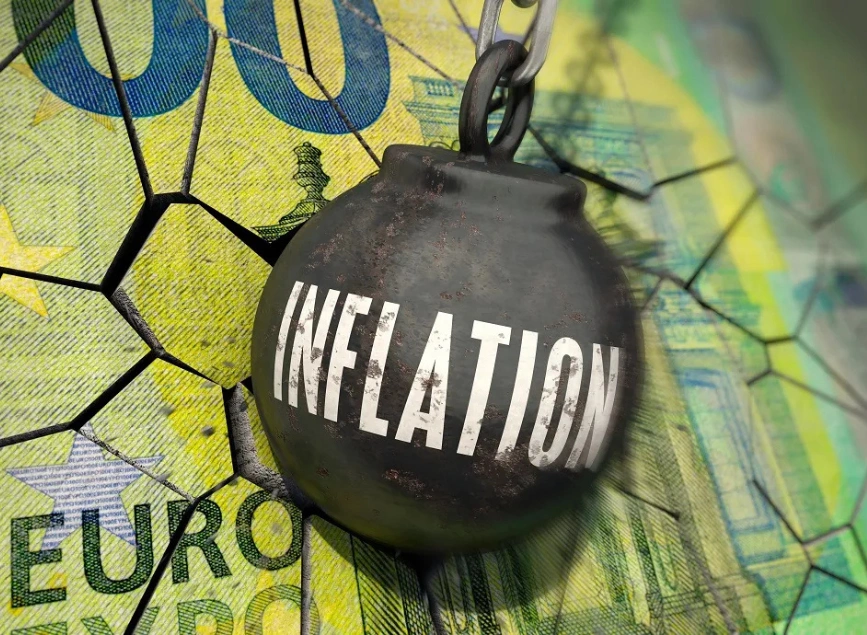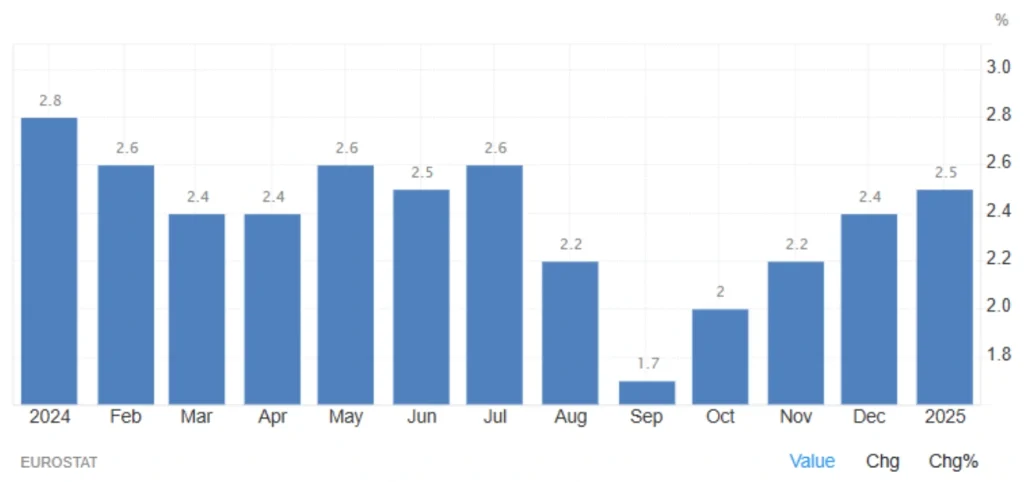
Eurozone Inflation Hits New High in January 2025
The eurozone began 2025 with a notable economic shift as inflation rose to 2.5 percent in January, the highest level since July 2024. This increase, mainly driven by soaring energy costs, has drawn attention from economists, investors, and policymakers. But what does this really mean for markets, businesses, and consumers across Europe?
Inflation Surge: The Key Drivers Behind the Numbers
The primary force behind this inflation spike is the significant rise in energy prices, which climbed 1.9 percent compared to just 0.1 percent in December. Rising energy costs have widespread effects, influencing manufacturing, transportation, and household utility bills.
Mixed Signals from Other Sectors
While energy prices surged, other sectors showed more stability. Non-energy industrial goods inflation held steady at 0.5 percent. The service sector saw a slight slowdown, dropping from 4 percent in December to 3.9 percent. Prices for food, alcohol, and tobacco also eased, falling from 2.6 percent to 2.3 percent.
Core Inflation Remains Stable
Core inflation, which excludes volatile categories like food and energy, stayed at 2.7 percent for the fifth consecutive month, marking its lowest point since early 2022. This suggests that broader inflationary pressures remain relatively contained and that the recent increase has been largely driven by external factors like energy prices.
Why Does This Inflation Spike Matter?
Higher energy prices extend far beyond utility bills, raising production and transportation costs. These increased costs eventually trickle down to consumers through higher prices on everyday goods and services.
Stable Core Inflation Offers Some Reassurance
The consistency of core inflation signals that underlying inflationary pressures are still under control. This steadiness suggests that the recent surge is more about temporary energy price shifts than a deeper economic imbalance.
Implications for ECB Monetary Policy
The European Central Bank may need to reassess its monetary policies if inflation continues to rise. So far, the ECB has maintained an accommodative stance, but persistent inflation could push the bank toward tightening measures such as raising interest rates.
Economic and Market Implications
Inflation is a critical economic indicator that affects consumer purchasing power, corporate profitability, and monetary policy decisions. Rising inflation can reduce consumer spending and increase production costs for businesses, potentially slowing economic growth.
How Financial Markets Are Reacting
A rise in inflation often weakens the euro as investors expect the ECB to continue or expand its accommodative monetary policies. Higher inflation can also reduce profit margins for businesses, especially those in industries sensitive to energy costs, like manufacturing and transportation. If inflation persists, the ECB might respond by raising interest rates, affecting borrowing costs and investments across the eurozone.
Read More: Decline in Eurozone Economic Sentiment Index
Regional and Geopolitical Implications
Different Effects Across Eurozone Nations
The effects of inflation are not uniform across all eurozone countries. Nations that rely heavily on energy imports may feel the impact more acutely, facing higher production costs and energy bills.
Boost in Export Competitiveness
A weaker euro could help increase the competitiveness of eurozone exports. As the currency loses value, goods from the region become more affordable for international buyers, potentially boosting exports.
Government Policy Adjustments
Rising inflation may prompt governments to adjust fiscal policies to support their economies. These adjustments could include targeted stimulus measures, tax reforms, or subsidies to help ease the burden of higher costs.

Inflation: A Quick Refresher
Inflation refers to the general rise in prices across an economy, which reduces the purchasing power of money. It is commonly measured by the Consumer Price Index, which tracks the cost of a typical basket of goods and services over time.
The Three Main Types of Inflation
Cost-push inflation occurs when production costs rise, often due to higher prices for raw materials or energy. Demand-pull inflation happens when demand for goods and services exceeds supply, leading to higher prices. Imported inflation is caused by rising prices of imported goods, often due to global market changes or currency fluctuations.
How Inflation Affects the Economy
Inflation can erode consumer purchasing power, making goods and services more expensive. It also increases production costs, as businesses face higher prices for raw materials and energy. Central banks often respond by raising interest rates to slow inflation, which can affect borrowing and investment.
What’s Next for Eurozone Inflation?
The recent surge in inflation, largely driven by rising energy costs, raises some concerns, but the stability of core inflation suggests that broader pressures are under control. The European Central Bank is likely to maintain its accommodative policies for now, but if inflation continues to rise, an interest rate hike could be on the horizon.
A weaker euro could boost exports, but higher production costs may strain businesses and consumers alike. Geopolitical factors and fluctuations in the energy market will likely remain significant influences on inflation in the coming months.
Final Thoughts
Inflation affects every layer of the economy, from household budgets to international trade. As energy prices climb and geopolitical uncertainties continue, keeping a close watch on eurozone inflation trends will be essential for businesses, policymakers, and consumers alike. The full impact of these inflationary pressures is still unfolding, and the months ahead could prove decisive for the region’s economic outlook.
Share
Hot topics

How to profit in a bear market
When markets are rising, confidence comes easily. People feel smart, risks feel smaller, and mistakes are often forgiven by the trend. A bear market is different, As prices decrease, so...
Read more




Submit comment
Your email address will not be published. Required fields are marked *